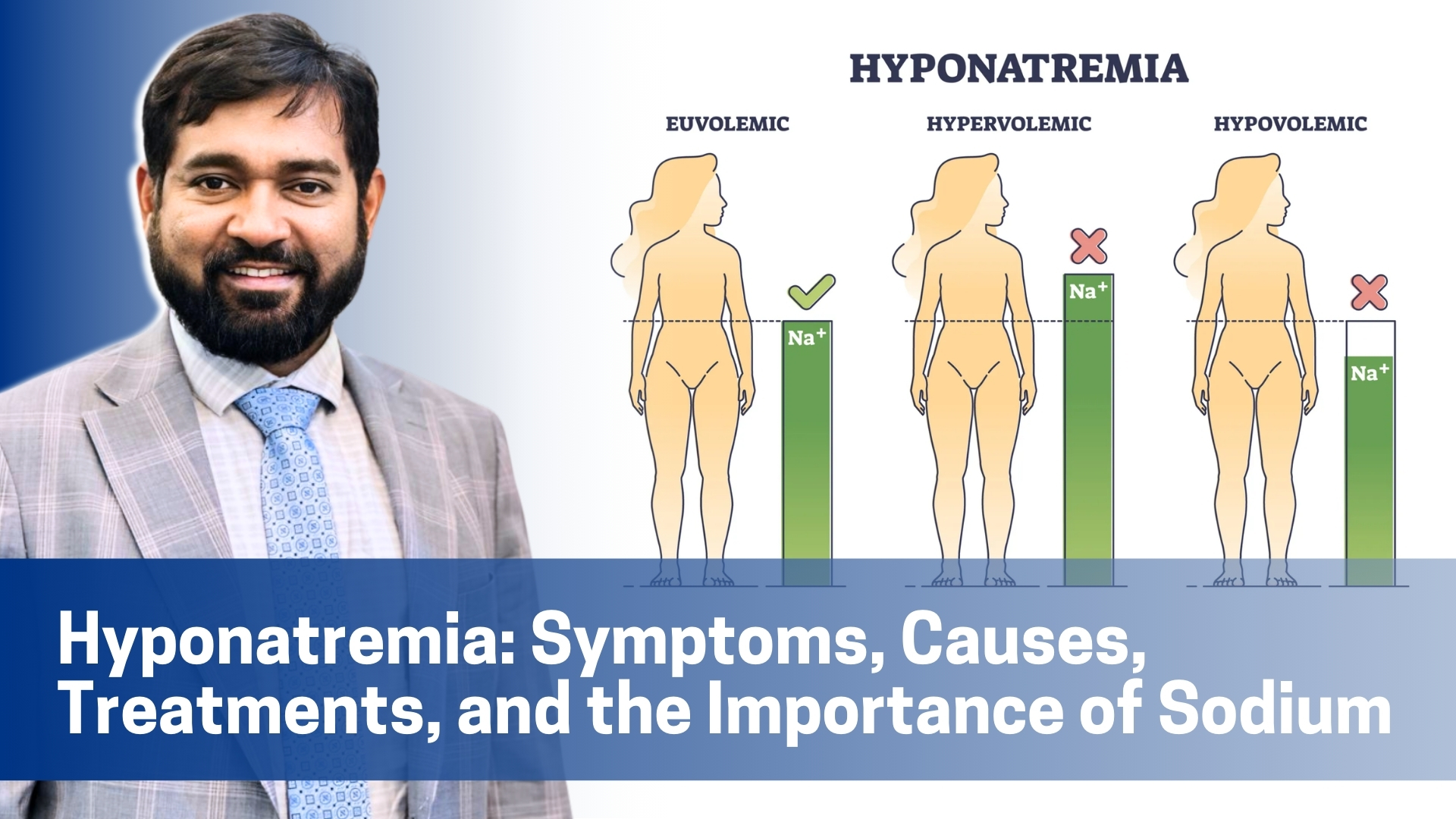27
Water Intoxication: Why Sodium Is Essential for Proper Hydration
Water is one of the most essential elements for human survival. It makes up a significant portion of the human body, plays an important role in regulating temperature, and is involved in a range of physiological processes, from digestion to nutrient absorption. While hydration is vital for maintaining good health, it is equally important to ensure that water is consumed in balance with other essential electrolytes like sodium.
This balance helps prevent water intoxication, a potentially dangerous condition that occurs when an individual consumes excessive amounts of water, diluting the sodium levels in the bloodstream. Sodium plays a crucial role in proper hydration and maintaining electrolyte balance. This article will explore the importance of sodium for hydration and why its role is crucial in preventing water intoxication.
Understanding Water Intoxication
Water intoxication, also known as hyponatremia, is a condition that arises when the body’s sodium levels drop significantly due to excessive water intake. Sodium is an electrolyte that helps regulate fluid balance in the body. When water intake exceeds the kidneys' ability to process it, the blood becomes diluted, reducing sodium concentrations. Sodium helps maintain the osmotic pressure required to keep fluid inside and outside the body’s cells balanced. When the blood becomes too diluted, the excess water may cause the cells to swell, which can lead to life-threatening conditions, including brain swelling, seizures, and coma.
The Role of Sodium in the Body
Sodium is an essential mineral in the body, playing a key role in maintaining hydration and fluid balance. It helps in regulating the amount of water inside and outside of cells, tissues, and organs. One of the primary functions of sodium is to maintain the proper osmotic pressure in the body. Osmosis refers to the movement of water from areas of low solute concentration to areas of high solute concentration. Sodium helps keep this balance by attracting water, thus ensuring that cells do not become dehydrated or overloaded with fluid.
Sodium also plays a significant role in nerve transmission and muscle function. It allows nerves to send electrical impulses and muscles to contract and relax properly. This is why sodium is often referred to as an electrolyte—because it helps facilitate electrical charges in the body. Moreover, sodium helps regulate blood pressure by controlling the volume of water in the bloodstream.
How Water Intoxication Occurs
Water intoxication happens when an individual drinks an excessive amount of water within a short period, overwhelming the kidneys' ability to excrete the fluid. The kidneys can process and excrete about 0.8 to 1.0 liters of water per hour. Drinking more than this amount can cause the kidneys to struggle in maintaining proper fluid balance. When large quantities of water flood the bloodstream, the sodium concentrations become diluted.
The dilution of sodium in the blood triggers a series of physiological responses. One of the most notable responses is cellular swelling. Cells in the body absorb water in an attempt to balance the sodium levels outside the cells. While this is generally a protective mechanism, if the imbalance is severe enough, it can lead to dangerous outcomes. The swelling of cells in the brain can lead to neurological symptoms, such as confusion, seizures, and even coma.
Symptoms of Water Intoxication
The early symptoms of water intoxication are often subtle, making it difficult to diagnose without medical intervention. However, it is important to recognize the signs early to prevent more severe complications. Some common symptoms include:
- Headache: As the brain swells, pressure is placed on surrounding tissues, causing a headache.
- Nausea and Vomiting: These symptoms often arise as the body attempts to rid itself of excess water.
- Dizziness: A drop in sodium levels can cause low blood pressure, leading to dizziness and fainting.
- Confusion: The brain is highly sensitive to electrolyte imbalances, and confusion is a common sign of water intoxication.
- Seizures: In more severe cases, brain swelling can trigger seizures due to a lack of sodium to regulate nerve function.
- Coma and Death: If left untreated, severe hyponatremia can lead to coma or death as the brain swells to dangerous levels.
Preventing Water Intoxication
-
Maintain a Balanced Fluid Intake: One of the most effective ways to prevent water intoxication is to maintain a balanced intake of fluids. While staying hydrated is important, excessive consumption of water, especially in a short period, should be avoided. It is crucial to understand that while water is essential for hydration, the body also needs sodium to regulate water levels.
-
Electrolyte Solutions: When engaging in physical activity, particularly in hot weather or during intense exercise, it is important to replenish electrolytes like sodium, potassium, and magnesium. Sports drinks or electrolyte solutions are designed to provide both hydration and electrolytes, which can help maintain the balance of sodium in the body.
-
Monitor Water Intake During Exercise: For individuals who exercise or perform strenuous activities for extended periods, it is important to drink water gradually throughout the day, rather than consuming large quantities at once. Drinking too much water while exercising, without replacing electrolytes, can increase the risk of water intoxication.
-
Dietary Sodium: Sodium can also be replenished through food sources. Sodium-rich foods include salted nuts, pickles, olives, and soups. For those who engage in activities that promote heavy sweating or loss of electrolytes, consuming small amounts of sodium-rich snacks during the day can help maintain proper hydration levels.
-
Recognizing Symptoms: If you notice symptoms such as confusion, nausea, or headache after drinking large amounts of water, it is important to stop consuming water immediately and seek medical help. Early intervention is critical to avoid complications such as brain swelling or seizures.
Conclusion
While water is essential for hydration and overall health, it is crucial to recognize the role sodium plays in maintaining the body’s fluid balance. Sodium is not just an important mineral for maintaining hydration—it is also necessary for proper nerve function, muscle contraction, and regulating blood pressure. Water intoxication, or hyponatremia, occurs when the body’s sodium levels drop too low due to excessive water intake. This condition can lead to serious health risks, including brain swelling, seizures, and even death.
To avoid water intoxication, it is important to balance water consumption with adequate sodium intake, especially when engaging in activities that cause excessive sweating or water loss. Hydration is not just about drinking enough water—it is about drinking water in a way that maintains the body’s electrolyte balance, with sodium playing a pivotal role. By understanding the importance of sodium and practicing proper hydration, individuals can stay healthy and avoid the dangers of water intoxication.
Here are 15 references for information on water intoxication and hydration:
-
"Can You Drink Too Much Water?" - Discusses the potential risks of excessive water intake, including dilution of sodium levels.
https://www.uhhospitals.org -
"Water Intoxication: Symptoms, Causes, Treatment, and More" - Insights into water intoxication effects and sodium balance.
https://www.health.com -
"Water Intoxication - Nursing Science" - Covers overhydration challenges and its effects on health, focusing on sodium's role.
https://nursing-science.com -
"How Much Water is Too Much?" - Outlines the dangers of excessive water intake and how to maintain hydration.
https://www.nytimes.com -
"Understanding Hyponatremia and Water Intoxication" - Focuses on hyponatremia and its relation to overhydration.
https://www.webmd.com -
"Hydration: How Much Is Too Much?" - Offers practical advice for healthy hydration and risks of overconsumption.
https://www.mayoclinic.org -
"Water Intoxication: An Overview" - Covers symptoms and prevention strategies related to overhydration.
https://www.medicalnewstoday.com -
"The Role of Sodium in Hydration" - Explains how sodium helps regulate hydration and prevent overhydration.
https://www.scientificamerican.com -
"Water Intoxication: What to Know" - A comprehensive explanation of water intoxication symptoms and causes.
https://www.cbc.ca -
"Water and Sodium: The Balancing Act for Hydration" - Discusses how sodium and water interact to maintain proper hydration.
https://www.healthline.com -
"Symptoms of Water Intoxication: How Much Water is Safe to Drink?" - An overview of water intoxication risks and prevention tips.
https://www.webmd.com -
"Why Too Much Water Can Be Dangerous" - Explores how excessive water intake can lead to serious health issues.
https://www.theguardian.com -
"Water Intoxication: What Happens When You Drink Too Much Water?" - Details the impact of overhydration and the importance of sodium.
https://www.stanfordhealthcare.org -
"Hydration: Balancing Fluids in the Body" - Tips on balancing fluid intake and avoiding overhydration.
https://www.acsm.org -
"The Importance of Sodium in Hydration" - Discusses why sodium is essential for hydration and preventing overhydration.
https://www.ncbi.nlm.nih.gov




